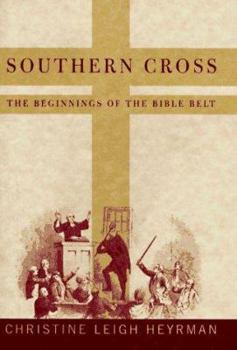Southern Cross: The Beginnings of the Bible Belt
Select Format
Select Condition 
Book Overview
Revealing a surprising paradox at the heart of America's "Bible Belt," Christine Leigh Heyrman examines how the conservative religious traditions so strongly associated with the South evolved out of... This description may be from another edition of this product.
Format:Hardcover
Language:English
ISBN:0679446389
ISBN13:9780679446385
Release Date:April 1997
Publisher:Alfred A. Knopf
Length:336 Pages
Weight:1.61 lbs.
Dimensions:1.5" x 6.7" x 9.6"
Customer Reviews
5 ratings
The Origin of the Bible Belt
Published by Thriftbooks.com User , 17 years ago
A facinating tour of religion in early America. Particularly interesting for the light it brings to various conservative religous groups and cults in todays news.
Adapting evangelicalism for a southern audience
Published by Thriftbooks.com User , 23 years ago
In Southern Cross: The Beginnings of the Bible Belt, Christine Heyrman traces the difficulties encountered by 18th century evangelicals in spreading Baptist and Methodist beliefs to the South, and discusses the remedies they employed to make their faith more acceptable within southern culture. Heyrman argues that in philosophy and modes of worship, the evangelical message was often at odds with prevailing cultural norms in the South. To win converts, sects had to modify their message, in some ways rejecting important theological underpinnings in order to gain membership. While evangelical religion is now seen as one of the bastions of conservative southern values, Heyrman asserts that this was not always the case, and that only in the 19th century did the evangelicals take on the characteristics we now associate with them. To support her argument, Heyrman relies primarily on church records, the diaries and letters of itinerant preachers, and a number of secondary studies of southern culture. Heyrman believes that a number of factors accounted for the slow growth of evangelicalism in the 18th century South, among them an unwillingness among the lower classes to upset the gentry by adopting preachers who publicly spoke out against slavery, fear of upsetting the social hierarchy, and a cultural unwillingness to accept such a deeply personal and introspective conversion process. Many potential converts were unwilling to submit to such a demanding moralism, or feared being overcome by the despondency that struck some converts. The evangelicals?use of young and tactless itinerant preachers in a culture that placed value upon maturity and deference also contributed to their unpopularity. Itinerancy itself was also an issue, since Methodist preachers were responsible for disciplining members who they did not personally know well. Additionally, the deference accorded to women and blacks within the church was offensive to white males, the churches were seen as destabilizing to family values because members were encouraged to put the church before their families, and the preachers themselves struck many as unmanly in a society that placed premiums on masculinity. To combat these problems, the churches began in the 19th century to tone down their attacks on slavery and immoral gentry behavior. They also reduced the roles of women and blacks within the churches, and encouraged preachers to have families and exhibit more masculine characteristics. However, while the changes Heyrman cites may have made evangelicals appear less objectionable to potential converts, she never considers ways in which the churches became more inviting. She does not question why anyone would be attracted to evangelicalism, only why they might oppose it less. Because of this, the phenomenal growth that the sects did eventually come to enjoy is never explained; rather than showing the reasons why evangelical religion did become such an important part of southern life, her s
great informative stimulating delightful read.
Published by Thriftbooks.com User , 25 years ago
the work of a first class historian. i am looking forward to more books by this excellant researcher.
Great history. Great read.
Published by Thriftbooks.com User , 25 years ago
Heyrman tells an interesting tale in an engaging way while she carefully backs her statements. This book has much to offer the general reader. The author provides insight into how religious movements may be born in reaction against change and potential loss of power. At the same time, Heyrman never comes off as having an axe to grind.
Heyrman is convincing.
Published by Thriftbooks.com User , 26 years ago
Before I finished reading this book, someone asked me what it was about. Off the cuff, I said it was about how the South got religion. I have since discovered that I was not far off the mark. Heyrman's concern is with the transformation that overcame the South during the 18th and 19th centuries as it encountered the onslaught of evangelical religion. It seems the South was not always that bastion of "old-time religion" as is sometimes thought. Heyrman's explanation for this is as captivating as it is convincing






